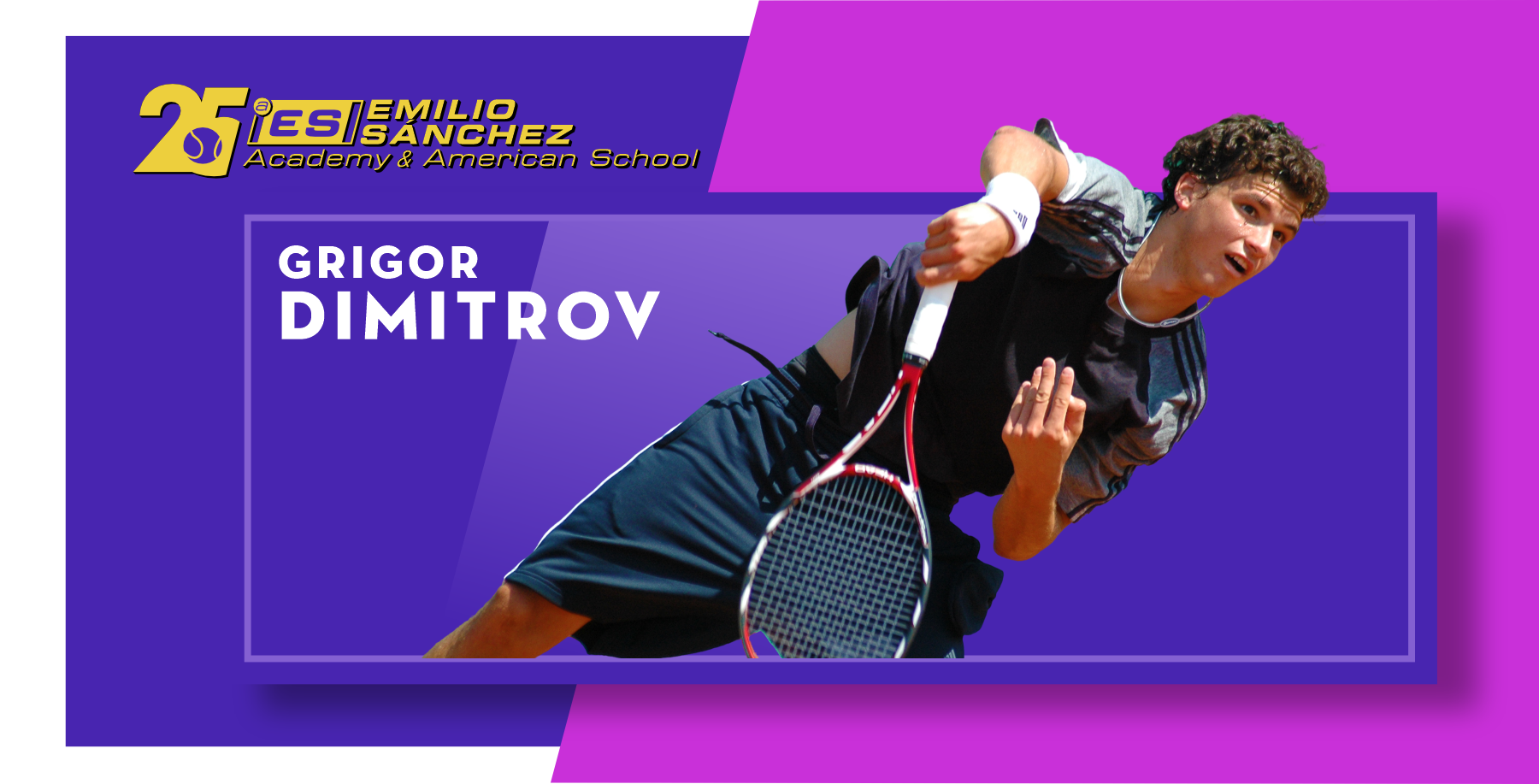
In the world of tennis, few stories are as captivating as the journey of Grigor Dimitrov. The Bulgarian player arrived at Emilio Sanchez Academy in 2007 to train during 2 seasons. Under the guidance of coaches Pato Alvarez and Emilio Sanchez Vicario, Dimitrov’s talent began to blossom and his unique style predicted he would go far.
During his stay at Emilio Sanchez Academy Dimitrov’s meteoric rise was marked by remarkable achievements. In 2008, he clinched two Junior Grand Slam titles at Wimbledon and the U.S. Open, ascending to the coveted position of Junior World No. 1. With a resolute decision, he bid farewell to the junior circuit, setting his sights on the professional arena.
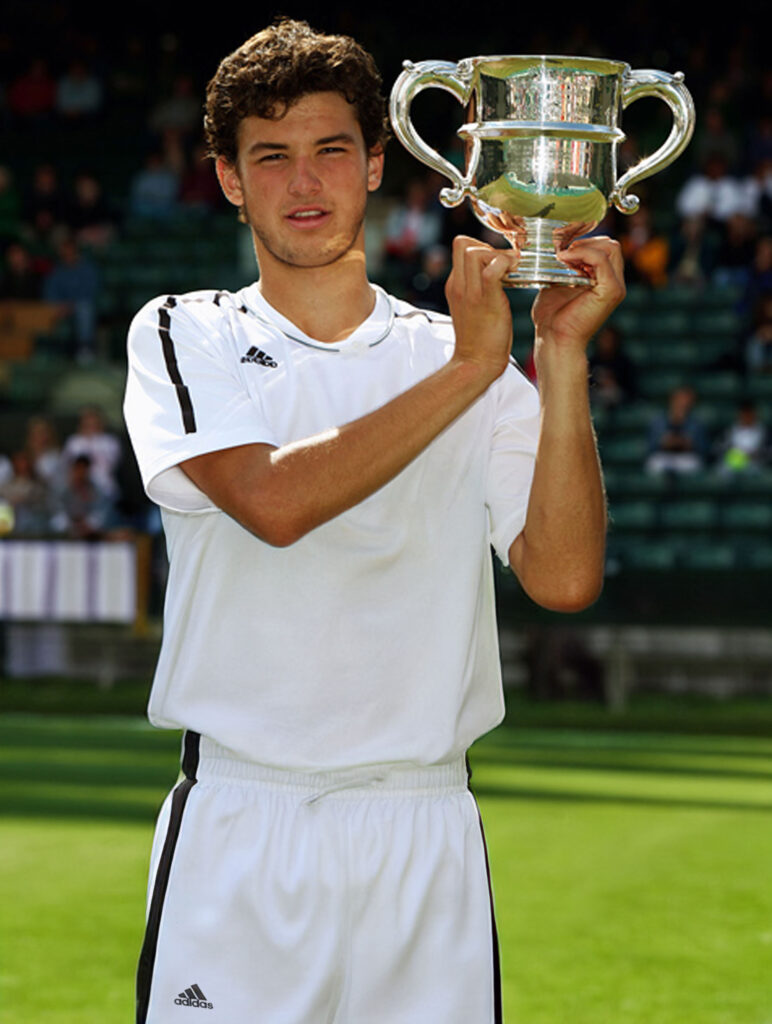
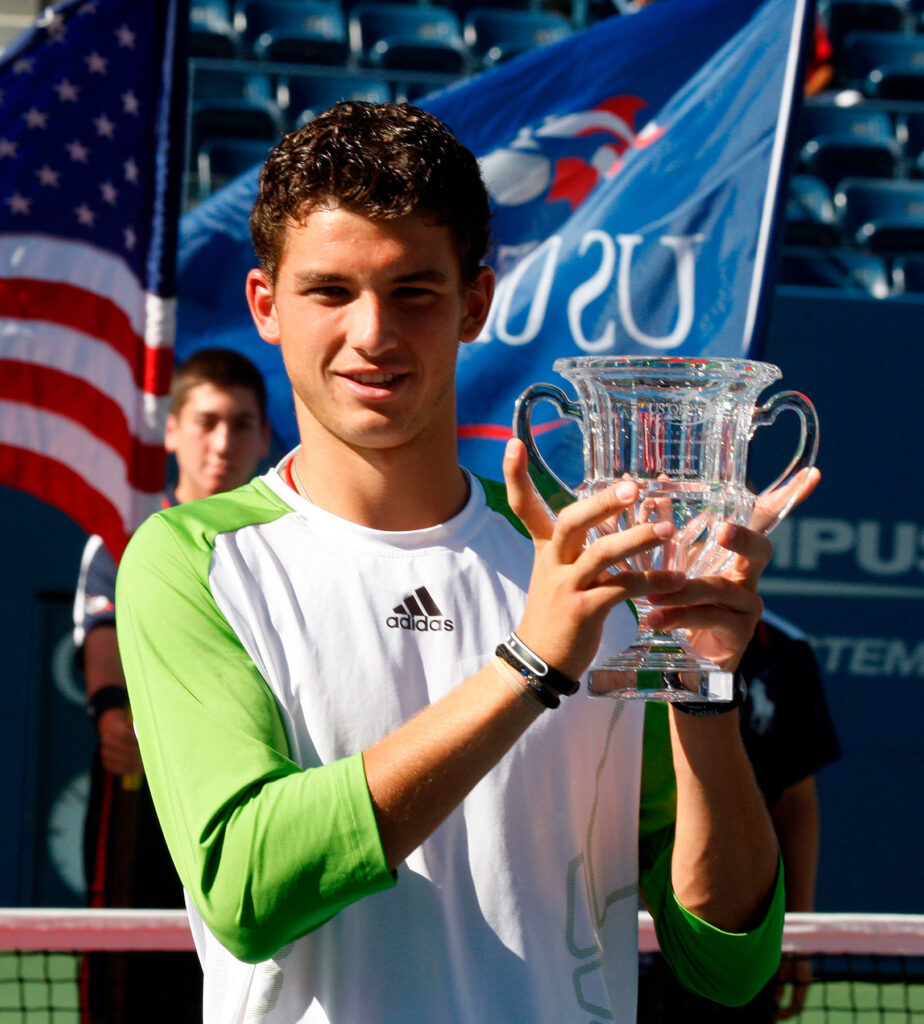
Under the tutelage of Dani Vallverdú, another student-athlete of the ES Academy, Dimitrov’s journey continued to evolve. Embarking on a career spanning over 15 years on the ATP tour, today Dimitrov is experiencing a resurgence in his game. In 2024 alone, he secured the prestigious Australian Open title and clinched the runner-up position in both the Miami Open and the Open 13 Provence, reaffirming his status as a formidable player in men’s tennis.
With a career-high ranking of No. 3 and currently holding the 10th position in the ATP rankings, Dimitrov’s legacy is one of resilience and determination. At the recent Mutua Madrid Open, Dimitrov crossed paths with his former mentor, Emilio Sanchez Vicario, sparking reflective conversations about his tennis journey and the profound impact of that sport on his life.
In an exclusive audio interview, Dimitrov delves into his insights, sharing thoughts on his enduring passion for tennis and the lessons learned throughout his tennis career.
Read the interview transcript here and listen to the full interview at the video-podcast below:
ES: Grigor, thank you so much for taking this time here in Madrid to speak with me about your time at the Emilio Sanchez Academy. What memories do you have from those times?
GD: I talk about my time at the academy quite often. I think it was very important for me and I think the help that I got there in my early development was vital. I come from Bulgaria, a country with not much heritage on that end, only in the women’s area. I view my decision to join an academy as pivotal and you guys were so kind to accommodate me. As you remember, I was a wild kid back then. Funny enough, I think that I needed to go through that during those years. Now when I look back, I will not trade them for anything because of all the experiences I had.
Certainly, when it comes to my performance on the court and the effort I’ve invested, I never shy away. I always knew that I could play tennis and do other things at the same time. But for some reason, I was always able to come back to my basics and that was to play the game. Even though I was not focusing on my work at times, there were a lot of things that inspired me at ES Academy, like being at a tennis academy with different players and interacting with different cultures. Therefore, I would never change those years, they were one of the best years of my life. And I think also that the experience I had shaped me and helped me not only to play better tennis, but to understand myself and go through experiences that shaped me at an early age. Therefore, to some extent, I also feel very lucky. It was a very special time for me.
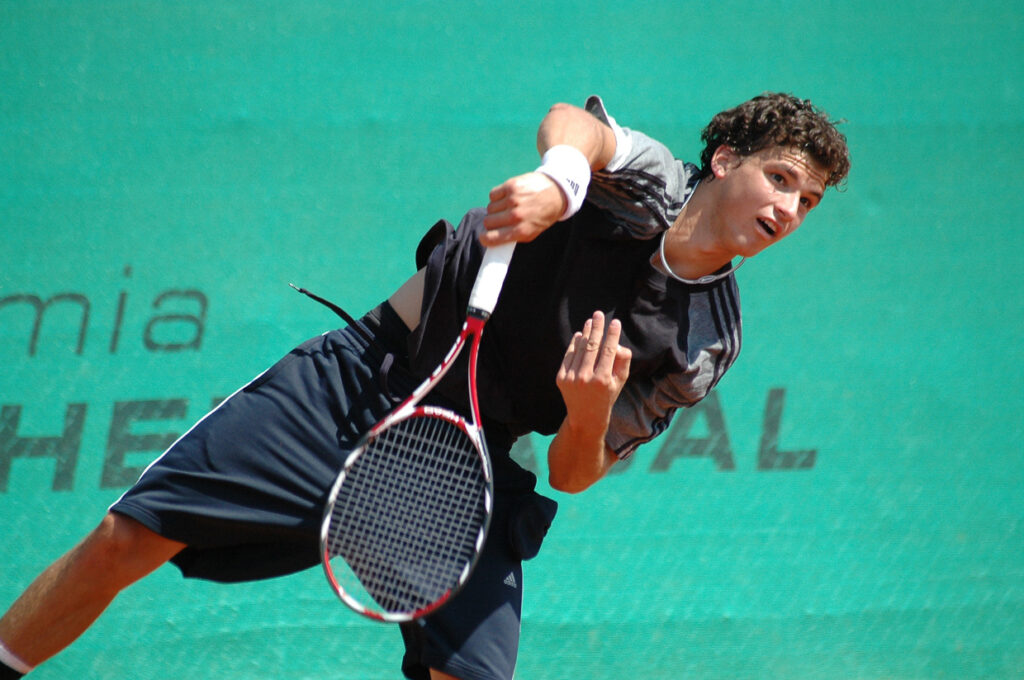
ES: Were you together with Daniel Vallverdú at the time?
GD: No, I missed him by a couple of years. But I still had so many good quality players to play with. I also had a lot of friends who were at the Academy at the same time, as well as some WTA players. I even served as a sparring partner, which, once again, helped me in adapting to varied ball trajectories. Just the diversity of what I was able to do, it was something that helped my game from a very different perspective. I knew how my game was and how I could develop it. Could I have been a bit more disciplined with certain things? Certainly. But at the same time, the experience that I gathered from every other area was even more vital to me.
ES: If you had to give some advice to someone else about that experience of going away from home and staying in a different environment to improve, what would you recommend to them?
GD: I always say it’s a choice. I think I left my home at 14, but I never felt I sacrificed anything. I didn’t have many other options anyway. However, I never felt the need to do something else or to explore something different because I knew I had my mindset on the sport itself. And the dream was there.
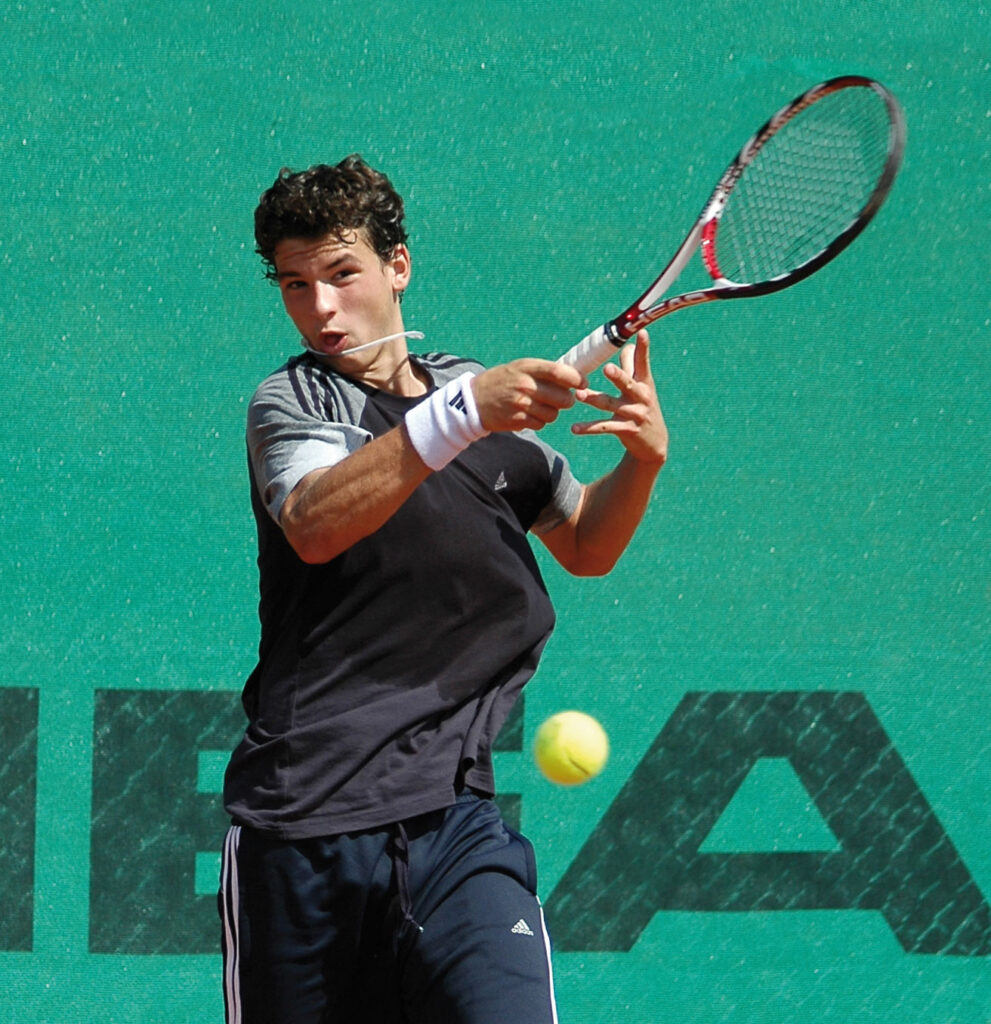
ES: You always had this great talent and amazing style, that lead everybody to compare you with the top players from a very early stage. What would you tell a kid who has a talent, what is the most important thing to go through?
GR: Never shy away from work. I think whatever else I was doing, I never shied away. Cutting corners was never an option for me. Even now when I look back, I might have done so many other things outside of the sport. However, whenever it was time to focus, I consistently prioritized completing the task at hand, whether it was finishing a basket, completing a practice session, or finishing my work. And I think that along the way you also build not only your character, but your discipline. You cannot be like 14 or 15 and be completely disciplined yet. It comes with time.
ES: How much does tennis help you to deal with other issues in life?
GD: Actually, I’ve said recently in quite a few interviews, that tennis saved my life in a couple of moments. I’ve been close to finishing my career a couple of times and I’m not afraid or shy to say it. I had big dips, huge dips in my career when I just thought that nothing could ever take me out of that. But guess what? Tennis was there for me. And it will always be there. Whether I win or lose. That’s the sport. That’s the pillar that has given me everything, from my life, to discipline, to meeting people, to being in a tennis academy, to meeting different cultures to finance. And of course, last but not least, it all comes down from you.
ES: We always talk about the different pillars in tennis, technical, tactical, physical, mental. For you, what is the most important pillar? And which one helps you the most to be resilient or fight adversity?
GD: I think calmness. As a player you know the feeling when you’re able to slow down your heart rate at any given time during the match, that gives you a tremendous amount of confidence and makes you believe. And all that happens behind the scenes. I think when you come to play in a tournament like this one, you come to compete. You’re not here to, you know, to do baskets or to try something else or to invent something. And everything happens behind it. It starts with your nutrition, with the way you sleep, the way you practice. And I always say the more you bleed during peaceful time, the less you bleed when you start competing. That’s just how it is. And of course, there’s moments when you’re going to struggle in tournaments and places and that’s when you need to stick to your deep core.
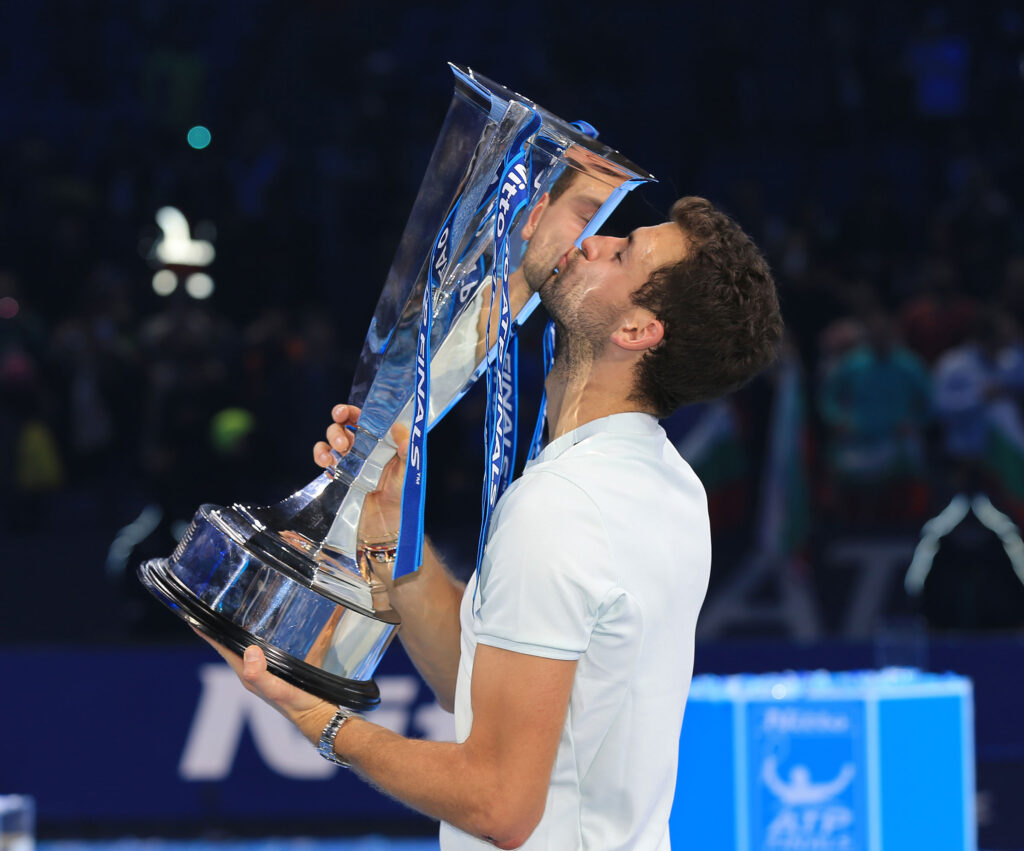
ES: Nowadays everybody talks today about mental issues. As tennis players, we are always on the edge. We always talk in the matches because someone in front of us is bothered. And we always talk about ourselves a lot. How is your conversation with yourself in the difficult moments, and how do you come out in 25 seconds from a bad state to a good state?
GD: I it’s it’s tough, it’s a real thing. Mental toughness is, I would say, one of the most trickiest and one of the most difficult things to do. In our sport, we have a next point. That’s just how it is. And then you need to think as fast as you can brush it off, I think that is the easiest thing. Of course, you get stuck in some moments, but let them in. Don’t fight them. I always say whatever comes, don’t fight it. I think the more you try to fight it, the more you’re going to hit a wall. It’s not easy. But all that comes with your experience, with the way you’ve dealt with big losses and big wins. At times, I often remember more of my big losses than the big wins, because this is where you think next time what to do better, what to work on. It’s some sort of a barrier that comes through and it’s about tenacity at the same time. If you don’t try it, you’ll never know. Tennis is not a sprint. I’ve been 15 years on tour now and I think it’s more of a marathon than anything else. You’re going to have your good moments and you’re going to have your bad moments. Nothing is ever that good or that bad. If you manage to find a balance and you feel a little bit more comfortable in your skin, anything on the court won’t really bother you. But it’s a combined work on and off the court.
ES: You’ve mentioned that you have struggled at some moments in your life. What are the positives that made you come out of them? What helped you get out of those situations?
GD: The basics: family, friends. I think these are the most vital things in life. If you think about it, tennis is such a little period of our lives. I always say that because I’m realizing it more and more every year. I’m getting closer to the end than I was at the beginning. But you can still see and understand the two ends. And I also think that you need to be able to see the two sides of the coin. When I was struggling, I always leaned into my discipline. That’s it. I leaned on the hard work and, and I kept believing that it would eventually come back. Tennis is a sport where it doesn’t matter if you have two amazing weeks of practice. You could end up losing five tournaments in a row in the first round.
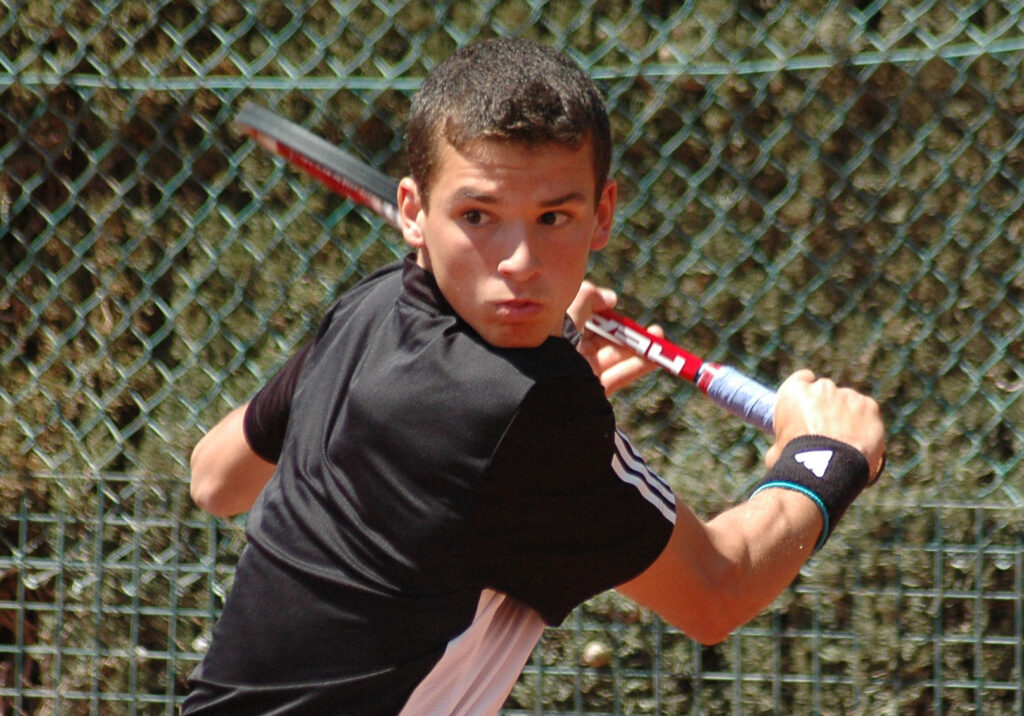
ES: You’ve had two seasons with Daniel Vallverdú. The first, when you did well and won the Masters. (Daniel was also a student for years at the ES Academy. He’s also going to be the topic of one of our 25 success stories because he has made the transition from tennis player to tournament director, etc.) Then you stopped working with him and later decided to team up again. How important has Daniel been in this process of coming back?
GD: He’s been vital in very different moments throughout my career. But of course, for us, it was not only that. Our friendship was more important than anything else. Everyone has fights, everyone finds their own reasons for things and at a certain moment we both needed some time apart. Now somehow, it’s a new beginning. We’ve also had to find a different way to work things out, so we don’t repeat the same mistakes. Plus, we’ve added Jamie Delgado, my fitness coach for so many years. I think it’s good to have that perspective.
ES: To have different voices is good for your motivation?
GD: I think so but also when you’re so many years on the tour you cannot be too linear, you need to have a diversity of work that helps you to keep fresh and improve, to find new goals, to be more excited to go at it every day. Of course, no one wakes up every day thinking I’m very excited to go do whatever it is that you do. We all have our moments due to the way we deal with situations. However, more and more I’ve paid attention to whom I’m having next to me. The selection of people around me has been very meticulous just because I’m very protective of my own energy and at the same time I want to make sure that when I’m going out there, I’m 100% ready. I don’t know how much time I have left to keep doing what I do, but I want to make sure that every time I’m out there I’m ready.
ES: You’ve now reached a certain age, but it seems like you are ascending like a young player climbing up because your level has improved a lot lately. Do you think that this can be the best moment of your career, due to the way you’re playing and the way you’re putting things together? Because that’s the ultimate goal, right?
GD: Of course, but to me at the same time it’s also important to enjoy my journey as well as to enjoy it with the people I’m with. The destination angle for sure is going to be the best thing, but also to look back and know that I tried everything possible and that I did it my way, that I did everything possible to invest myself into it. Honestly to me this is a priceless thing. I don’t know if I’m going be thinking like this one day when I’m retired and I look back, but for now I’m treating the wins and losses kind of in the same way. When I’m having good tournaments it’s when I’m very appreciative and thankful, but also when I’m having losses like last week from two match points, I’m like, OK, it was meant to happen that way. Sometimes a door closes but a huge window opens, so you never know.
ES: Can you mention three words about our Tennis Academy? Whatever comes first to your mind.
GD: Experience, hard work and hustle.
ES: Thank you so much Grigor, you’re the best. Good luck and thank you.















